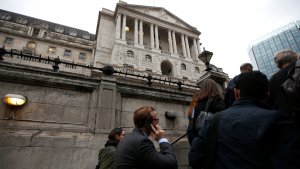The Bank of England fears shortages of workers and skills mismatches will make it hard to return inflation to its 2% target.
UK Starting Salaries Rise At Slowest Pace In nearly 3 years: survey
The Bank of England fears shortages of workers and skills mismatches will make it hard to return inflation to its 2% target.

Starting salaries for newly appointed employees in Britain rose at the slowest pace since March 2021 last month, according to industry data that offered some comfort to the Bank of England in its fight against inflation pressures.
The Recruitment and Employment Confederation monthly survey has pointed towards a cooling in Britain's hot hiring market for much of this year although it has been slow to translate into broader official labour force data.
The BoE is keeping a close watch on labour market trends as it fears shortages of workers and skills mismatches since Brexit and the COVID-19 pandemic will make it hard to return inflation - currently 4.6% - to its 2% target.
The BoE is expected to keep interest rates at a 15-year high next week and restate that it is not close to cutting them.
Official data showed average pay excluding bonuses grew at an annual rate of 7.7% in the third quarter of 2023, only just off a previous record high.
By contrast, the REC survey showed a marked slowdown in the growth of starting salaries and pay rates for temporary staff in November. The latter increased at the weakest pace since February 2021.
"Businesses want to plan for the year ahead, but the prospect of faltering UK economic growth means the certainty they need isn't there. This is now impacting starting salaries," said Claire Warnes, a partner at KPMG which sponsors the survey.
The BoE predicts Britain's economy will record zero growth in 2024 and other forecasting bodies are not much more optimistic.
REC said job vacancies fell last month for only the second time since February 2021 while the number of job seekers rose by the most since December 2020. Recruiters were "widely linking this to redundancies and workers concerned about their current job security", it added.
The survey was based on responses from 400 recruitment agencies collected from Nov. 9 to Nov. 24.
(Reporting by David Milliken; Editing by William Schomberg)
Thanks for signing up to Minutehack alerts.
Brilliant editorials heading your way soon.
Okay, Thanks!

